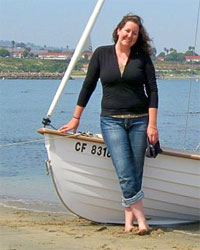Student Profile
Tania Darnton
"Science rules!" |
 class of 2011 |
What CCS Means to Me:
CCS was the biggest reason why I chose to attend UCSB. As an incoming freshman, I knew I wanted to study chemistry and be involved in research, and although I was attracted to UCSB, I feared falling through the cracks at such a large school. However, as soon as I found out about the CCS Chemistry program, I knew it was right for me. I have never regretted my choice. CCS provides a small community of like-minded scholars and a top-notch support staff of advisors who are absolutely dedicated to their students, all surrounded by the myriad benefits and opportunities available at a large research university.
In addition, CCS is a flexible program that allows its students to pursue passions outside their major field. I have studied Spanish since I was twelve years old, and as a junior at UCSB I opted to study abroad in Madrid for a year through the UC EAP program to hone my language skills. Although I put off my studies in chemistry while I was abroad, I had the full support of the College despite the fact that my graduation date was pushed back by two quarters - something that wouldn't have been possible in the College of Letters and Science.
Future Plans
Participating in undergraduate research in two different labs while at UCSB has made me certain that I want to pursue a Ph.D in chemistry. I applied to graduate school in 2010 l and have been accepted to Caltech, MIT, UC Berkeley, UW-Madison, Columbia, and UC San Diego. I am planning to attend Caltech and specialize in the field of synthetic inorganic chemistry. I hope to enter academia after my Ph.D work.
Awards
- Willard L. McRary Prize 2011
- Phi Lambda Upsilon
- Graduated with highest honors 2011
- CCS Faculty Executive Committee Service Award 2011
- UCSB University Award of Distinction 2011
- American Chemical Society Student Leadership Award 2011
- Phi Beta Kappa
- UCSB Regents Scholar 2006-2010
- Robert C. Byrd Scholar 2006-2010
- UCSB URCA Grant 2010
- CCS SURF Grant 2010
- UCSB RISE Grant 2008, 2011
Current Research
During my sophomore year of college I worked for Dr. Alison Butler, investigating the siderophores produced by nine different species of the Shewanella genus of marine bacteria found in the Black Sea as well as their methods of iron chelation. Siderophores are small iron-sequestering compounds secreted by microorganisms to scavenge
Fe3+ in iron-poor environments.
I currently work in Dr. Trevor Hayton's inorganic synthesis group. My project focuses on elucidating the basic coordination chemistry of late transition metals such as Cu and Zn, interest in which is driven by their importance as catalysts in several biologically relevant reactions. I have been using the strongly electron-donating ketimide ligand set (N=CR2) in an attempt to stabilize the high oxidation states of these transition metal ions.
